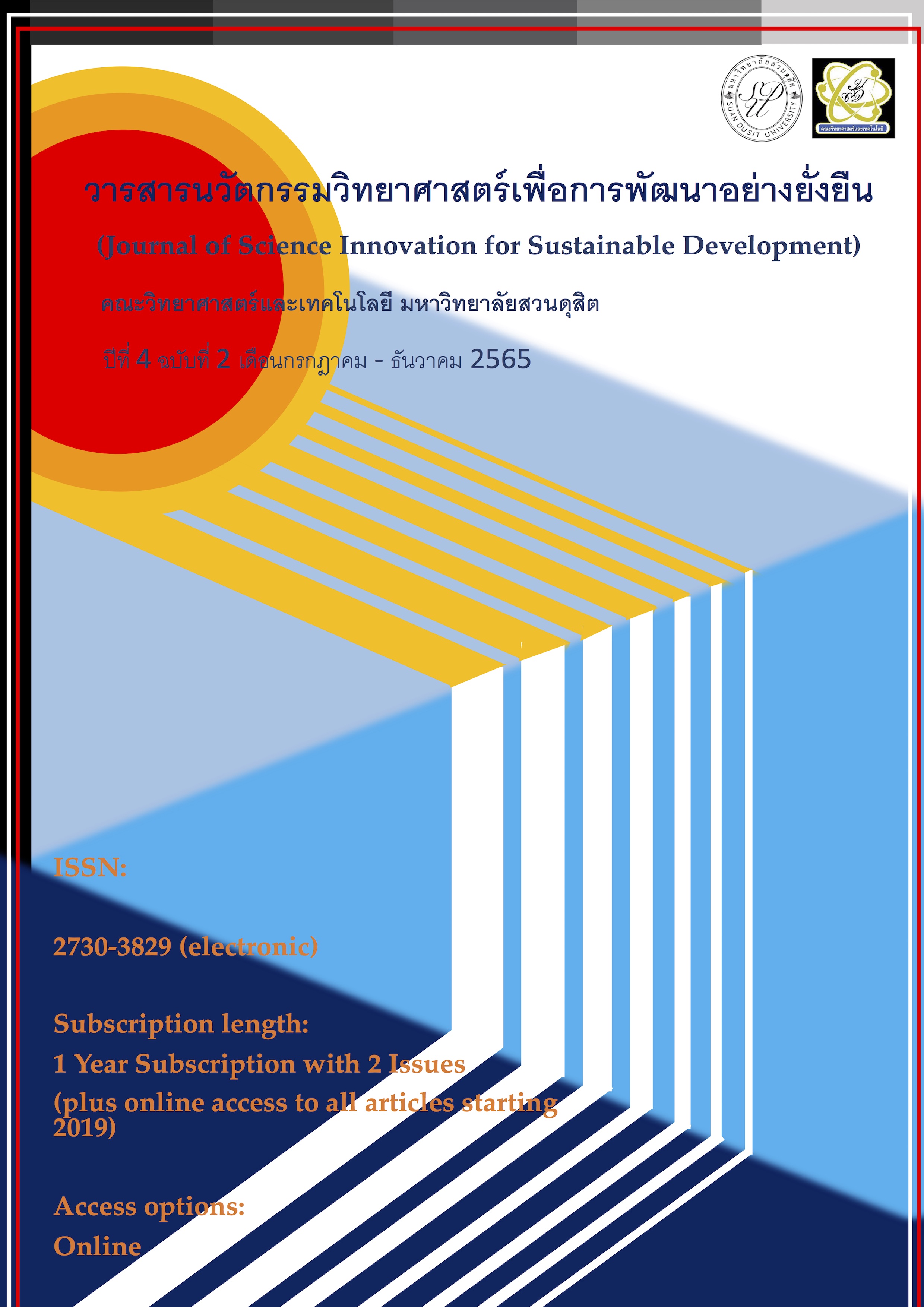การพัฒนาเกมล่าท้าผีโดยใช้เทคโนโลยีรู้จำเสียง ปฏิวัติ คงรัมย์1 เสาวลักษณ์ อร่ามพงศานุวัต1 กรัญญา สิทธิสงวน1,*
Main Article Content
บทคัดย่อ
เกมในประเทศไทยในปัจจุบันมีการเติบโต และขยายตัวขึ้นอย่างรวดเร็ว โดยเฉพาะเกมประเภทสยองขวัญและเอาตัวรอดเป็นเกมประเภทหนึ่งที่คนไทยพัฒนาจนเป็นที่ยอมรับต่อเวทีเกมในระดับโลก เช่น home sweet home, ARAYA เป็นต้น งานวิจัยนี้จึงได้แนวคิดที่จะเพิ่มความลุ้นระทึก ให้กับเกมสยองขวัญ โดยนำเทคโนโลยีการรู้จำเสียง มาเพิ่มความแปลกใหม่ ท้าทาย ที่ผู้เล่นจะต้องใช้ทักษะ ไหวพริบ และความจำในการท่องคาถาให้ถูกต้อง เพื่อเอาชีวิตรอดอีกด้วย ทั้งนี้จากผลการทดสอบการออกแบบ และความพึงพอใจในการใช้งาน ในด้านความสนุกสนาน เพลิดเพลิน และคุณภาพของภาพ จากกลุ่มเป้าหมาย เพศหญิง และชาย อายุระหว่าง 18-25 ปี จำนวน 15 คน พบว่าผู้เข้าร่วมการประเมินมีความพึงพอใจมาก โดยมีค่าคำนวณระดับความพึงพอใจเท่ากับ 4.47 และส่วนเบี่ยงเบนมาตรฐานเท่ากับ 0.34
Article Details

อนุญาตภายใต้เงื่อนไข Creative Commons Attribution-NonCommercial-NoDerivatives 4.0 International License.
ลิขสิทธิ์ต้นฉบับที่ได้รับการตีพิมพ์ในวารสารนวัตกรรมวิทยาศาสตร์เพื่อการพัฒนาอย่างยั่งยืนถือเป็นกรรมสิทธิ์ของคณะวิทยาศาสตร์และเทคโนโลยี มหาวิทยาลัยสวนดุสิต ห้ามผู้ใดนำข้อความทั้งหมดหรือบางส่วนไปพิมพ์ซ้ำ เว้นแต่จะได้รับอนุญาตอย่างเป็นลายลักษณ์อักษรจากคณะวิทยาศาสตร์และเทคโนโลยี มหาวิทยาลัยสวนดุสิต นอกจากนี้ เนื้อหาที่ปรากฎในบทความเป็นความรับผิดชอบของผู้เขียน ทั้งนี้ไม่รวมความผิดพลาดอันเกิดจากเทคนิคการพิมพ์
เอกสารอ้างอิง
Anzai, S., Ogawa, T., and Hoshino, J. (2021). Speech recognition game interface to increase intimacy with characters. Entertainment computing – ICEC 2021. ICEC 2021. Lecture Notes in Computer Science, 13056, 167–180. https://doi.org/10.1007/978-3-030-89394-1_13.
Arsenault, D. (2009). Video game genre, evolution and innovation. Journal for Computer Game Culture, 3 (2), 149–176. https://doi.org/10.7557/23.6003.
Casvean, T. M. (2016). An Introduction to videogame genre theory. Understanding videogame genre framework. Athens Journal of Mass Media and Communications, 2(1), 57–68.
Chaichitwanidchakol, P. and Feungchan, W. (2021). The sound interaction framework for people with autism on mobile devices. TNI Journal of Engineering and Technology, 9(1), 48–59. [In Thai].
Chaikan, P., and Chaikan, M. (2016). The development of Thai language pronunciation training software focused on words spelling with ร-ล using a Hidden-Markov Model. Thaksin University Journal, 19(1), 64–74. [In Thai].
Charoonpankasem, R., Tanyasiri, D., Semcharoen, P., and Charoensuk, N. (2018). The development of teaching methods using reading application with speech recognition and vocabulary guessing game. Huachiew Chalermprakiet Science and Technology Journal, 4(1), 56–68. [In Thai].
Elhady, R., Elmahdy, M., Hamed, I., Abdennadher, S. (2018). A game with a purpose for automatic detection of children’s speech disabilities using limited speech resources. ICALP 2017. Communications in Computer and Information Science, 782, 79–89. https://doi.org/10.1007/978-3-319-73500-9_6.
Finnegan, T. (2015). Learning unity android game development. Place: Packt Publishing Ltd, 148–154.
Huang, X. and Deng, L. (2010). Handbook of natural language processing. Second ed., Chapman & Hall/CRC, 339–363.
Inchamnan, W. (2016). An analysis of creative process learning in computer game activities through player experiences. IAFOR Journal of Education, 4(2), 121–122.
Kenetic Games. (2020). [Online]. Retrieved December 10, 2021, from Phasmophobia. https://store.steampowered.com/app/739630/Phasmophobia/.
Lavieri, E. (2015). Getting Started with Unity 5. Place: Packt Publishing Ltd.
Menard, M., Wagstaff., B. (2015). Game development with unity. Second Edition. Place: Cengage Learning PTR, 405–410.
Mühlhaus, J., Frieg, H., Bilda, K., Ritterfeld, U. (2017). Game-based speech rehabilitation for people with parkinson’s disease. Human and Technological Environments. UAHCI 2017. Lecture Notes in Computer Science, 10279, 76-85. https://doi.org/10.1007/978-3-319-58700-4_7.
Poonsuwannatee, R. (2021). The result of using reading pronunciation skills training with speech recognition for effectiveness readiness in Thai pronunciation of announcing techniques in broadcasting. STOU academic Journal of research and innovation (Humanities and Social Science), 1(1), 33–42. [In Thai].
Procci, K., Chao, A., Bohnsack, J., Olsen, T., and Bowers, C. (2012). Usability in serious games: A model for small development teams. Computer Technology and Application, 3, 315–329.
Rungsaensuksakul, W. (2021). [Online]. Retrieved February 13, 2021, from Home Sweet Home Survive. https://www.thairath.co.th/lifestyle/tech/2031240/.
Sam, P. (2016). [Online]. Retrieved November 29, 2021, from ARAYA. https://www.mangozero.com/ araya-horror-game/.
Toki, E. I., Zakopoulou, V., Tatsis, G., Plachouras, K., Siafaka, V., Kosma, E. I., Chronopoulos, S. K., Filippidis, D. E., Nikopoulos, G., Pange, J., and Manos, A. (2022). A Game-based smart system identifying developmental speech and language disorders in child communication: A protocol towards digital clinical diagnostic procedures. new realities, mobile systems and applications. IMCL 2021. Lecture Notes in Networks and Systems, 411, 559–568. https://doi.org/10.1007/978-3-030-96296-8_50.
Unity Technologies. (2021) [Online]. Retrieved November 14, 2021, from KeywordRecognizer. https://docs.unity3d.com/ScriptReference/Windows.Speech.KeywordRecognizer.
Wang, C., Liu, Z., Fels, S. (2010). Everyone can do magic: An interactive game with speech and gesture recognition. Entertainment computing - ICEC 2010. ICEC 2010. Lecture Notes in Computer Science, 6243, 32-42. https://doi.org/10.1007/978-3-642-15399-0_4.


